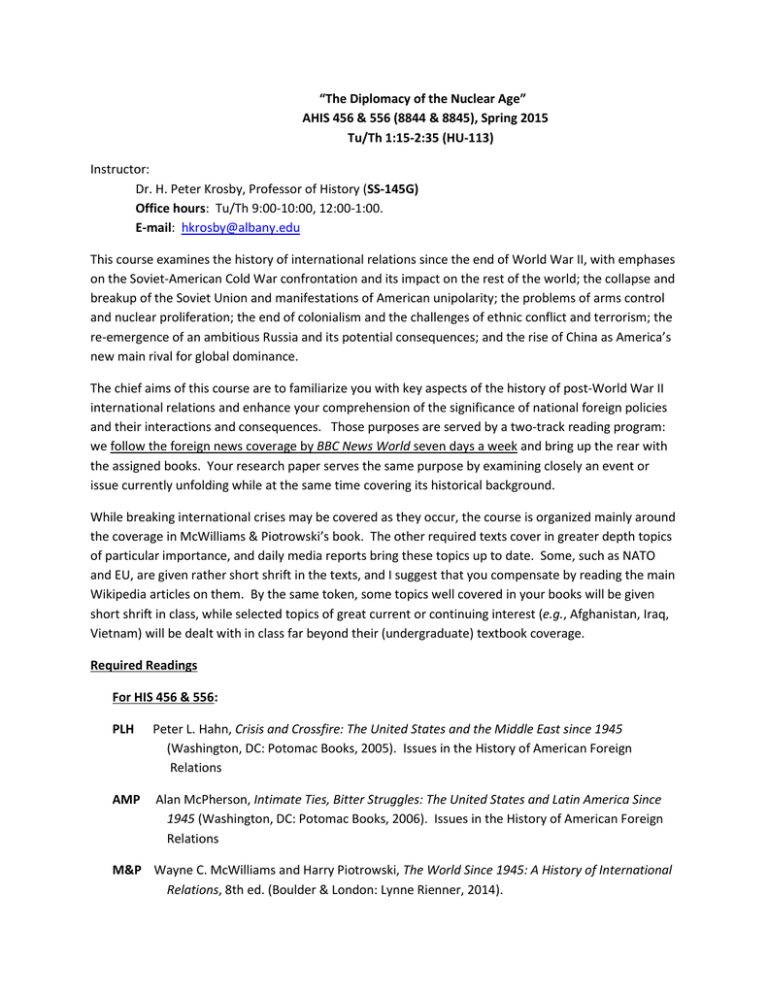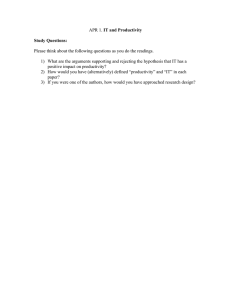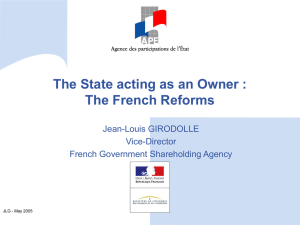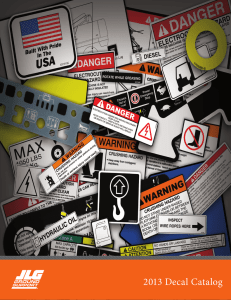HIS 456/556 Syllabus
advertisement

“The Diplomacy of the Nuclear Age” AHIS 456 & 556 (8844 & 8845), Spring 2015 Tu/Th 1:15-2:35 (HU-113) Instructor: Dr. H. Peter Krosby, Professor of History (SS-145G) Office hours: Tu/Th 9:00-10:00, 12:00-1:00. E-mail: hkrosby@albany.edu This course examines the history of international relations since the end of World War II, with emphases on the Soviet-American Cold War confrontation and its impact on the rest of the world; the collapse and breakup of the Soviet Union and manifestations of American unipolarity; the problems of arms control and nuclear proliferation; the end of colonialism and the challenges of ethnic conflict and terrorism; the re-emergence of an ambitious Russia and its potential consequences; and the rise of China as America’s new main rival for global dominance. The chief aims of this course are to familiarize you with key aspects of the history of post-World War II international relations and enhance your comprehension of the significance of national foreign policies and their interactions and consequences. Those purposes are served by a two-track reading program: we follow the foreign news coverage by BBC News World seven days a week and bring up the rear with the assigned books. Your research paper serves the same purpose by examining closely an event or issue currently unfolding while at the same time covering its historical background. While breaking international crises may be covered as they occur, the course is organized mainly around the coverage in McWilliams & Piotrowski’s book. The other required texts cover in greater depth topics of particular importance, and daily media reports bring these topics up to date. Some, such as NATO and EU, are given rather short shrift in the texts, and I suggest that you compensate by reading the main Wikipedia articles on them. By the same token, some topics well covered in your books will be given short shrift in class, while selected topics of great current or continuing interest (e.g., Afghanistan, Iraq, Vietnam) will be dealt with in class far beyond their (undergraduate) textbook coverage. Required Readings For HIS 456 & 556: PLH Peter L. Hahn, Crisis and Crossfire: The United States and the Middle East since 1945 (Washington, DC: Potomac Books, 2005). Issues in the History of American Foreign Relations AMP Alan McPherson, Intimate Ties, Bitter Struggles: The United States and Latin America Since 1945 (Washington, DC: Potomac Books, 2006). Issues in the History of American Foreign Relations M&P Wayne C. McWilliams and Harry Piotrowski, The World Since 1945: A History of International Relations, 8th ed. (Boulder & London: Lynne Rienner, 2014). M&W Don Munton and David A. Welch, The Cuban Missile Crisis: A Concise History, 2nd ed. (New York: Oxford University Press, 2011). SLS Susan L. Shirk, China: Fragile Superpower (Oxford & New York: Oxford University Press, 2007). DOCS Internet documents. BBC You will follow key international news daily by Googling “BBC News World” and click on “US & Canada”, “Latin America”, “UK”, “Africa”, “Asia”, “Europe”, and “Mid-East”. For HIS 556 Only: JLG John Lewis Gaddis, Strategies of Containment: A Critical Appraisal of American National Security Policy during the Cold War, revised & expanded ed. (Oxford & New York: Oxford University Press, 2005). PT Patrick Tyler, A World of Trouble: The White House and the Middle East – from the Cold War to the War on Terror (New York: Farrar, Straus and Giroux, 2010). Tests Ignore the official final exam schedule! The only exams in this course are four 30-minute in-class essay tests, each worth 20% of your final grade. A list of questions will be distributed well in advance of each test, three or more of those questions will be on the test, and you will answer one. Listed questions may be adjusted to take recent events into account. Your lowest test grade will be dropped unless you duplicate it, but you may not opt to skip one; a missed test must be made up before the following test, or it will cost you 20% of the course grade. Questions written in italics are designed especially for HIS 556 in order to take into account the extra readings and higher expectations, but graduate students are free to choose any test question they wish. Unscheduled current events quizzes may be sprung on you. They will have no specific value except that the quality of your performance on them will influence your final grade slightly in a positive (if A or B) or negative (if D or E) direction. Grading is A-E and reflects knowledge, comprehension, and written presentation. If requested, an “I” may be recorded, but only if at least three of the five assignments have been completed. In-class Coverage, Test by Test Feb. 12: ` Origins of the Cold War. - Yalta & Potsdam conferences and their consequences. - Sovietization of Eastern Europe. - 1948 Berlin crisis. U.S containment policy. - The ‘Long Telegram’, Truman Doctrine, Marshall Plan, NATO, NSC 68, Korea. The Cuban missile crisis and other close calls. Readings: M&P pp. 1-151, M&W pp. 1-103, DOCS: “Tehran Conference,” “Yalta Conference,” “Potsdam Conference,” “The Avalon Project: The Tehran Conference,” “The Avalon Project: The Yalta Conference,” “The Avalon Project: The Potsdam Conference,” “George Kennan’s ‘Long Telegram’,” “False Alarms in the Nuclear Age,” “Able Archer 83;” JLG pp. 3-196. [Class days: Jan. 22, 27, 29, Feb. 3, 5, 10, 12] Mar. 10: The Arab-Israeli conflict, 1945-present. The wars in Indochina, 1945-75. Readings: PLH pp. 1-34, 47-67, 87-104, 140-42, 147-56, 158-69, M&P pp. 152-293, DOCS: “Paris Peace Accords;” JLG pp. 197-341, PT pp. 64-106, 135-209, 249-351. [Class days: Feb. 17, 19, 24, 26, Mar. 3, 5, 10] Apr. 9: The U.S. and Latin America. The U.S. and China. Readings: AMP pp. 1-177, M&P pp. 294-440, SLS pp. 1-269; JLG pp. 342-79. [Class days: Mar. 12, 24, 26, 31, Apr. 2, 7, 9] May 5: Nuclear arms control. The U.S. and the Middle East. - The Gulf Wars. - Afghanistan. A quarter-century of American unipolarity. Readings: PLH pp. 35-46, 69-85, 105-31, 133-35, 137-39, 143-46, 157, 170-81, M&P pp. 441-581, DOCS: “Arms Control,” “Strategic Defense Initiative,” “National Missile Defense;” “Ground-Based Midcourse Defense”, “US missile defense complex in Poland”, “US missile defense system in Asia-Pacific Region”, “Aegis Ballistic Missile Defense System”, JLG pp. 380-91, PT pp. 1 63, 107-34, 210-48, 352-556. [Class days: Apr. 14, 16, 21, 23, 28, 30, May 5] Research Paper A research paper, worth 20% of your final grade, is required. Optimum length is 3,000 words for HIS 456 and 5,000 for HIS 556. It must be typed, double-spaced with one-inch margins all around, carefully proof-read, and without visible corrections. A title page precedes the text, endnotes follow it (but footnotes are preferred!), and a bibliography listing all works usefully consulted, whether cited or not, brings up the rear. Number all pages (text, endnotes, bibliography, but not the title page) from 1 up. Use no covers; just staple in the top left corner. The Happy Footnoter will be distributed as a model for the general appearance of your paper and for when and how to use notes. Topics must be chosen tentatively by Feb. 5; a preliminary bibliography, typed and in proper form, is due on Feb. 26 (newspaper articles are not listed, only the newspapers themselves); and the final paper is due on Apr. 28. All topics must be based on events or issues evolving during this semester. Hence your time frame is Jan. 22–Apr. 27, 2014, and at least 50% of your coverage must fall within that period; the rest must be pertinent historical background. All topics must deal with international relations, which could be one state’s foreign policy, relations between or among states in any field (e.g., security, culture, trade), or the impact of certain issues (e.g., illegal immigration, ethnic strife, economic integration, terrorism) on international relations. For the current events portion of your paper, BBC News World will be your initial source of information. Copy its main news coverage daily, record for later reference the source and date of publication on each item, and organize the accumulating collection topically. Supplement those items with other current sources such as high quality news magazines (e.g., The Economist), serious foreign affairs journals (e.g., Foreign Affairs, International Security, Foreign Policy, Current History, Journal of Contemporary China, Journal of Cold War Studies, Diplomatic History), and newspapers with good foreign affairs coverage (The New York Times, Wall Street Journal, The Washington Post, Financial Times). Newspapers often put articles on the Internet, which is also a good source for background history, the nature and history of international organizations, etc. Journals also put their articles on the Internet but usually make you pay to read or copy them. Check with the UA Library Periodical Desk on how to use them for free. Your research may start with a careful perusal of the bibliographies and source notes found in your textbooks. Information on topics such as yours is also likely to be found in journals, often indexed; in back issues of newspapers, also often indexed; as well as in books. Libraries remain good places to look for those things! On many topics, published collections of government and other records will be useful, even essential, for historical background, e.g., Foreign Relations of the United States (multiple annual volumes; for complete listings, check: www.state.gov/r/pa/ho/frus/c4035.htm). General Rules Attendance is expected, and a signature list will be circulated most of the time. To arrive late or leave early is discourteous and disruptive -- and a disciplinary offense (see Code of Student Conduct). Cheating earns an instant final grade of “E” in this course, will be reported to the applicable administrative office, and may lead to suspension or expulsion. Read the “Standards of Academic Integrity” in the undergraduate or graduate bulletin, and note this warning from the History Department: Plagiarism is taking (which includes purchasing) the words and ideas of another and passing them off as one’s own work. If in a formal paper a student quotes someone, that student must use quotation marks and give a citation. Paraphrased or borrowed ideas are to be identified by proper citations. Plagiarism will result, at the minimum, in the student failing the assignment.





